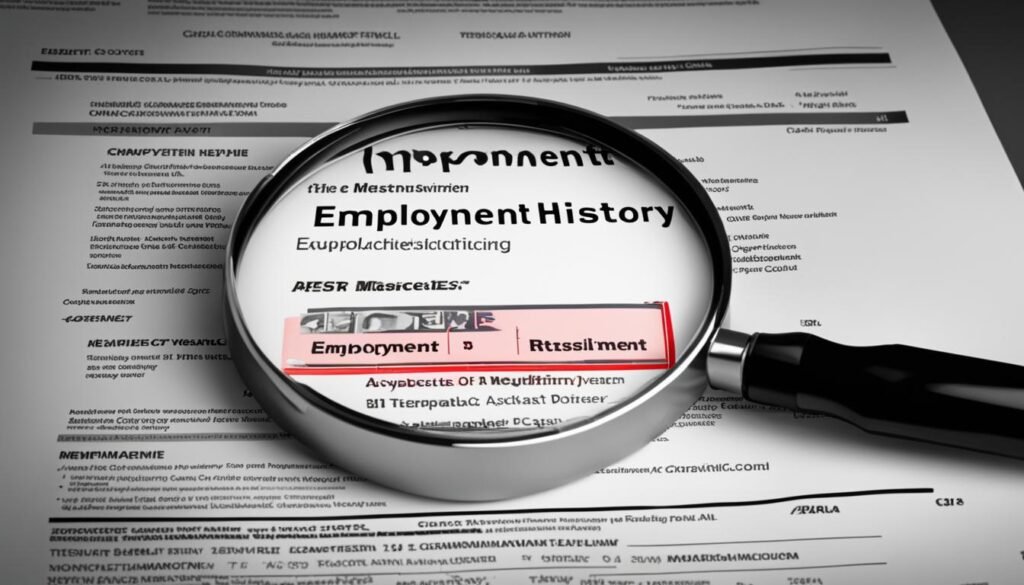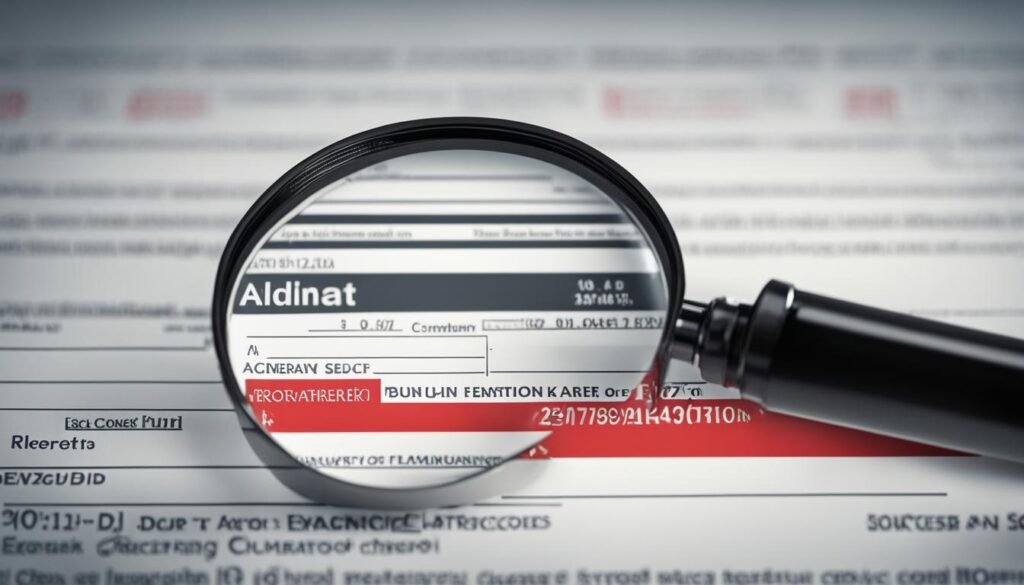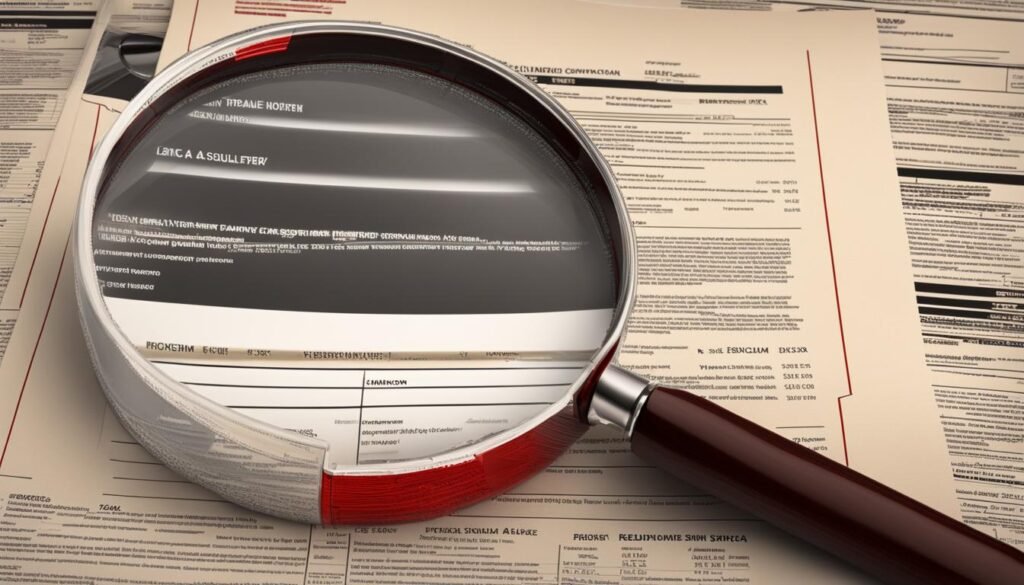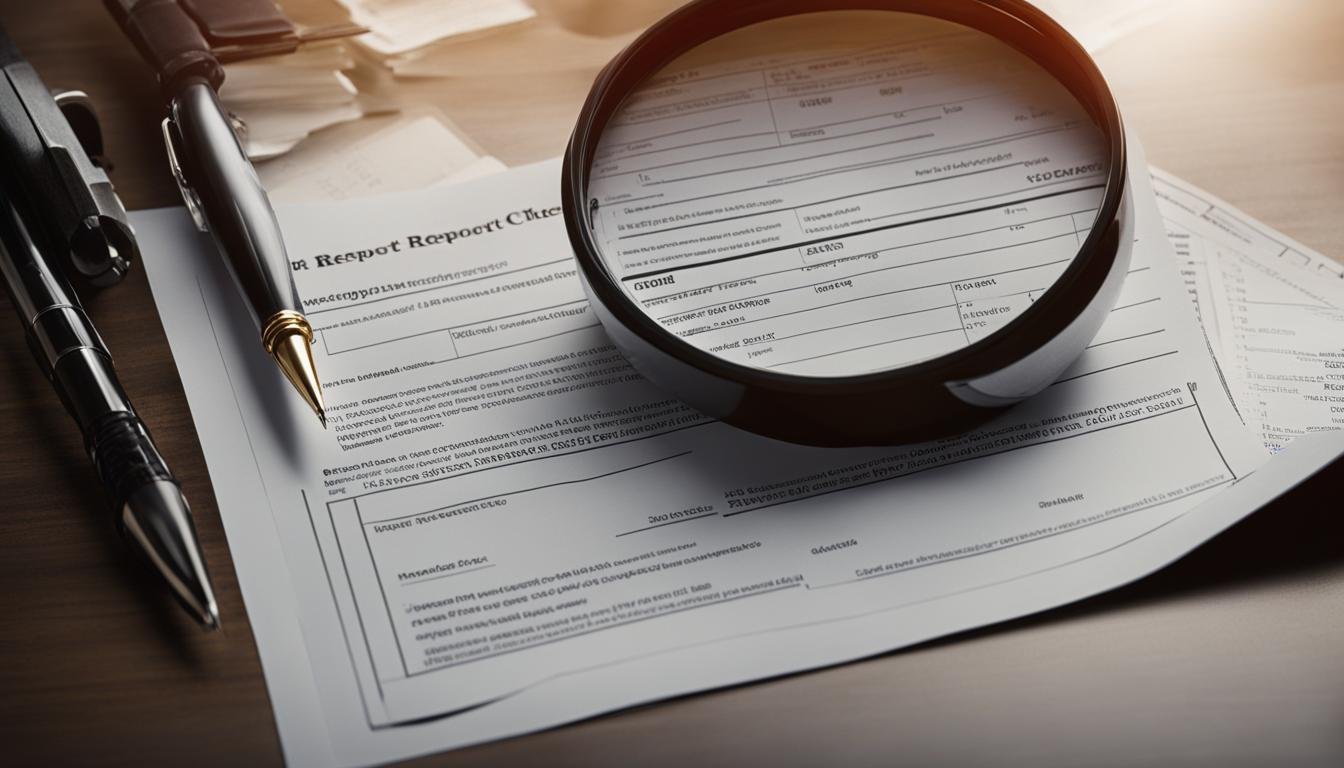Are you wondering if you can omit previous employers from your background check? Employment history checks are an essential part of the hiring process, and employers rely on this information to make informed decisions. In this article, we’ll explore the background check requirements, the employment verification process, and whether you can exclude past employers from background checks.
Key Takeaways:
- Employment history checks are crucial for employers to assess a candidate’s suitability for a position.
- Background check companies can help verify the accuracy of your employment history through contacting listed employers.
- Being honest about your employment history is important to maintain integrity during the hiring process.
- Employers cannot access a comprehensive list of your previous employers through background checks.
- Conducting a self-employment history check can help ensure the accuracy of your job history.
The Scope of a Background Check for Employment
A background check for employment is a vital part of the hiring process for many employers. It aims to uncover relevant information about a candidate’s background and verify the accuracy of the information provided on their resume or job application. While a background check does not directly provide a comprehensive list of a candidate’s previous employers, it can assist in detecting resume dishonesty and uncovering important details. Let’s delve into the key aspects of a background check for employment.
Public Records and Criminal Record Information
A background check typically includes a search for public records, which can reveal criminal record information about a candidate. This information helps employers assess the potential risks associated with hiring a candidate and make informed decisions. However, it’s important to note that a background check for employment does not solely focus on criminal records but also encompasses other aspects of a candidate’s background.
| Types of Information Checked in a Background Check | Description |
|---|---|
| Driving Records | Employers may verify a candidate’s driving records, especially if the position involves driving company vehicles or requires a valid driver’s license. |
| Credit Reports | In certain industries or positions that involve financial responsibilities, employers may review a candidate’s credit report to assess their financial trustworthiness. |
While the focus of a background check is not specifically on employment history, it can help identify any inconsistencies or red flags, prompting employers to conduct further investigation into a candidate’s job history. Employers may also choose to contact listed employers directly to verify job titles, dates of employment, and job responsibilities, ensuring the accuracy of a candidate’s employment history.

Conclusion
A background check for employment plays a crucial role in helping employers make informed hiring decisions. While it does not provide a comprehensive list of a candidate’s previous employers, it uncovers valuable information through public records, criminal record checks, driving records, and credit reports. By including employment history verification as part of the process, employers can ensure the accuracy of a candidate’s job history and detect any resume discrepancies. Being transparent and honest about employment history is vital for job seekers, as background checks can reveal any inaccuracies. Overall, a thorough background check for employment enhances the hiring process and promotes a more reliable workforce.
Verifying Employment History Through Background Checks
When conducting background checks, employers often rely on background screening companies to verify a candidate’s employment history. These companies have the resources and expertise to contact the employers listed on a candidate’s resume or job application. Through this employment verification process, background check companies confirm job titles, employment dates, and job responsibilities. This helps employers determine the accuracy of a candidate’s work history and identify any discrepancies or resumé lies.
During the employment history verification process, background check companies reach out to the listed employers via phone or email. They typically request specific details about the candidate’s work history, such as job titles, employment dates, and job responsibilities. By obtaining this information, employers can gain a clearer understanding of a candidate’s previous job roles and assess their suitability for the position they are applying for.
Verifying employment history through background checks plays a crucial role in ensuring that employers have accurate and reliable information about their prospective employees. It helps maintain the integrity of the hiring process and allows employers to make informed decisions based on a candidate’s true work experience. By partnering with a reputable background check company, employers can trust that the information provided by candidates is thoroughly verified and free from any misrepresentations.

Table: Example of Employment History Verification
| Employer | Job Title | Employment Dates | Job Responsibilities |
|---|---|---|---|
| ABC Company | Sales Associate | January 2018 – present | Responsible for generating sales leads and providing excellent customer service. |
| XYZ Corporation | Marketing Coordinator | June 2016 – December 2017 | Assisted in the development and execution of marketing campaigns and analyzed market trends. |
| 123 Industries | Administrative Assistant | March 2014 – May 2016 | Managed office operations, including scheduling appointments and coordinating meetings. |
The example table above demonstrates how employment history verification can provide employers with essential details about a candidate’s work history. By confirming job titles, employment dates, and job responsibilities, employers can assess a candidate’s qualifications and fit for a particular role. This verification process helps ensure that employers have accurate and reliable information to make informed hiring decisions.
Omitting or Forgetting to List a Job on Your Resumé
When crafting your resumé, it’s common to face the dilemma of whether to include every single job you’ve held or to omit certain positions. There are various reasons why you might choose to leave out previous jobs, such as irrelevance to your current career target or difficulty fitting all your work history within the usual one-page limit for resumés. However, it’s important to consider the potential impact of these omissions on your job search.
Leaving out a job can create work history gaps that employers may notice and question during the hiring process. While employers cannot run a background check specifically to uncover unlisted jobs, they may raise concerns about the reasons behind the omission. Hiring managers often view consistent employment history as a sign of reliability and commitment. Omitting a job without a valid explanation may raise red flags and create doubts about your honesty and reliability as a candidate.
To address this issue, it’s crucial to be transparent about your employment history. If you decide to leave out a job, be prepared to explain your reasons during the interview process. Be honest about your motivations and highlight the skills and experiences gained from your previous roles that are relevant to the position you’re applying for. By addressing any work history gaps transparently and providing valid explanations for omissions, you can maintain your credibility and increase your chances of securing a job.

Can Employers Check Your Past Employment History?
When it comes to background checks, employers may wonder about the extent to which they can verify a candidate’s past employment history. While background checks can provide valuable information, it’s important to understand their limitations and how they can be used to verify job details.
Employee background checks can reveal some information about a candidate’s past employers. However, the depth of verification depends on the resources available to the employer. For larger companies with more thorough background check processes, it is possible to confirm the details of a candidate’s past employment. This can include verifying job titles, dates of employment, and job responsibilities. However, it’s important to note that employers cannot access comprehensive databases of a candidate’s entire job history.
To ensure accuracy and comply with privacy laws, background checks typically focus on verifying the information provided by the candidate on their resume or job application. While they can provide valuable insights into a candidate’s work history, employers may also ask for references to gather additional information about a candidate’s character, work ethic, or integrity. These references can provide valuable insights into a candidate’s past performance and help employers make informed hiring decisions.
Overall, while employers can check a candidate’s past employment history to some extent, it’s important to recognize the limitations of background checks. They primarily focus on verifying the information provided by the candidate rather than providing a comprehensive list of past employers. By conducting thorough reference checks and utilizing additional vetting practices, employers can gather a more holistic understanding of a candidate’s work history and make informed hiring decisions.

Conducting an Employment History Check on Yourself

Verifying your own job history can be a valuable step in ensuring the accuracy of your resume and preparing for the hiring process. By conducting a self-employment history check, you can avoid omissions or inaccuracies that may raise concerns for potential employers. There are several methods you can use to obtain your work records and verify your job history.
Method 1: State Unemployment Office
Contacting your state’s unemployment office is one way to obtain your work records. They maintain records of your employment history for unemployment insurance purposes. You can request these records to verify the companies you have worked for and the dates of employment. Keep in mind that the availability and specific details provided by the state unemployment office may vary, so it’s important to check the requirements and processes specific to your state.
Method 2: Social Security Administration
The Social Security Administration provides a service called Social Security Earnings Information. You can request a report that provides a record of your earnings history, which includes details of your employment. This can be a useful resource for verifying your job history and ensuring that your resume accurately reflects your past work experience.
Method 3: Tax Returns
Reviewing your tax returns can also help you verify your job history. Your tax documents often include information about your employer, earnings, and other relevant employment details. By cross-referencing this information with your resume, you can ensure that you have included all relevant positions and accurately represented your work history.
Conducting a self-employment history check not only allows you to verify your job history, but it also demonstrates your commitment to honesty and accuracy. Employers appreciate candidates who take the time to ensure their resumes are truthful and factual. By being proactive in verifying your own job history, you can confidently present yourself to potential employers and increase your chances of success in the hiring process.
What Can Prior Employers Say About You?
During the background check process, employers may be contacted to verify basic details about a candidate’s employment, such as job titles and dates of employment. However, the extent to which prior employers can provide additional information about a candidate’s job performance or workplace concerns may vary. This variation is influenced by state laws and company policies regarding employee references and information disclosure.
Employers may choose to provide positive endorsements, highlighting a candidate’s strengths and skills. These endorsements can be valuable in showcasing a candidate’s qualifications and work ethic. However, some employers may limit their responses to avoid potential legal issues. They may choose not to disclose negative information or share concerns about a candidate’s workplace behavior or performance to mitigate the risk of defamation claims or legal disputes.
It is beneficial for job seekers to actively seek positive references from prior employers. By cultivating strong professional relationships and consistently performing well, individuals can increase their chances of receiving positive endorsements. Additionally, job seekers can leverage their network and seek recommendations from colleagues, supervisors, or mentors who can provide valuable insights into their work capabilities and character.
“I had the pleasure of working with [Candidate Name] for two years, and they consistently demonstrated exceptional problem-solving skills and a strong work ethic. They were an invaluable asset to our team, consistently delivering high-quality results and going above and beyond to meet project deadlines. I highly recommend [Candidate Name] for any position they pursue.”
While job seekers can anticipate positive endorsements from prior employers, it is essential to maintain honesty and professionalism throughout their work history. Respecting confidentiality agreements and workplace policies is crucial, as unethical conduct or violations of company rules can impact future references and job opportunities. It is equally important for employers to handle employee references responsibly, ensuring compliance with applicable laws and providing accurate and fair assessments of past employees.
| Employer References | Employee Background Checks | Job Performance Verification | Workplace Concerns | Positive Endorsements |
|---|---|---|---|---|
| Employers may be contacted to verify basic employment details. | Background checks can uncover information about a candidate’s job history. | Extent of job performance verification may vary based on state laws and company policies. | Employers may choose not to disclose workplace concerns to avoid legal issues. | Positive endorsements can highlight a candidate’s strengths and skills. |
| Job seekers should actively seek positive references from prior employers. | Honesty and professionalism are essential for maintaining positive references. | Employees should respect confidentiality agreements and workplace policies. | Employers should handle references responsibly and provide fair assessments. | Positive endorsements can enhance a candidate’s job prospects. |
By understanding the role of employer references in the hiring process, job seekers can navigate the background check process effectively and increase their chances of securing job offers.
Denial Due to Discrimination in Background Checks
Discrimination in background checks can have serious consequences for job seekers. Employers are prohibited from using a candidate’s background report information to make decisions based on certain protected categories, such as race or national origin. This is known as disparate impact, where a seemingly neutral policy or practice disproportionately affects individuals in protected categories. Employment discrimination laws, enforced by the Equal Employment Opportunity Commission (EEOC), aim to protect individuals from unfair treatment during the hiring process.
If you believe you have been denied a job opportunity due to discrimination in a background check, you have the right to file a complaint with the EEOC. The EEOC investigates charges of discrimination and works to ensure that employers are held accountable for their actions. It is important to gather any evidence or documentation that supports your claim and be prepared to provide details about the discriminatory practices you experienced.
“Employers cannot exclude individuals based on certain protected characteristics, such as race or national origin, unless there is a job-related reason and it is consistent with business necessity.”
By reporting instances of discrimination in background checks, individuals can help raise awareness and promote fair hiring practices. The EEOC plays a crucial role in enforcing employment discrimination laws and ensuring that employers adhere to legal guidelines. It is important to stand up for your rights and protect yourself against discriminatory practices in the job market.
| EEOC Complaint Process | Contact Information |
|---|---|
| 1. File a complaint with the EEOC within 180 days (or 300 days in some cases) of the alleged discrimination. | Equal Employment Opportunity Commission 1-800-669-4000 www.eeoc.gov |
| 2. The EEOC will conduct an investigation into the allegations and may attempt to resolve the dispute through mediation. | |
| 3. If mediation is unsuccessful, the EEOC may file a lawsuit on your behalf or issue a “right to sue” letter, allowing you to file a private lawsuit. |

Protecting Your Privacy in Background Checks
When going through the background check process, it is essential to take steps to protect your personal information. Safeguarding sensitive details such as your Social Security number and banking information is crucial to prevent identity theft and fraud. Here are some tips to ensure your privacy during background checks:
- Be cautious with personal information: Avoid providing sensitive information such as your Social Security number or banking details on initial applications or resumes. Employers may request this information later in the hiring process.
- Privacy on social media: Review your social media profiles and ensure that your privacy settings are set to restrict public access to personal information. Be mindful of the content you post and consider the potential impact it may have on your professional reputation.
- Job scam awareness: Be wary of potential job scams that request personal information upfront without a legitimate job offer or proper background check process. Research the company and verify their credibility before sharing any personal details.
“Protecting personal information during the background check process is essential to safeguard against identity theft and potential job scams. By being cautious with what information you share and maintaining privacy on social media platforms, you can reduce the risk of unauthorized access to your personal data.”
Remember, your privacy is important, and taking proactive measures to protect your personal information during the background check process is crucial. By being vigilant and mindful of the information you share, you can help ensure a safe and secure job search experience.

Note: The image above shows the importance of protecting personal information during background checks.
Reporting Issues with Background Checks
When it comes to background checks, issues can arise that may require reporting to the appropriate authorities. If you believe that an employer has obtained your background report without your permission or failed to provide the necessary notices during the background check process, you can take action by reporting the issue. The Federal Trade Commission (FTC) is the agency responsible for handling complaints related to background check violations. To report an issue, you can visit the ReportFraud.ftc.gov website and provide the necessary details.
Reporting unauthorized information sharing or job scams is crucial to protect your rights and privacy. Unauthorized sharing of sensitive personal information can lead to identity theft and other fraudulent activities. By reporting such incidents, you not only safeguard your own interests but also help prevent others from falling victim to similar scams. It is important to provide as much information as possible when reporting an issue, including any documentation or evidence that supports your claim.
Job scams are another common concern related to background checks. These scams often involve fraudulent job postings that aim to collect personal information or money from unsuspecting job seekers. If you encounter a job scam during the background check process, it is important to report it to the relevant authorities, such as the FTC or local law enforcement agencies. By doing so, you can help disrupt these criminal activities and protect others from becoming victims.
Protecting Yourself
While reporting issues with background checks is crucial, it is equally important to take proactive steps to protect yourself during the job search process. Be cautious about sharing personal information, such as your Social Security number or banking details, until you are certain that the employer is legitimate and the information is necessary for the background check or other employment-related purposes. Additionally, it is wise to maintain privacy on social media platforms and other online channels to prevent potential misuse of your personal information.
Remember, reporting issues with background checks not only helps protect yourself but also contributes to creating a safer job search environment for everyone. By reporting unauthorized information sharing, job scams, and other violations, you play a vital role in ensuring that employers adhere to the proper procedures and respect the privacy rights of job seekers.

| Reporting Issues with Background Checks | Protecting Yourself |
|---|---|
| • Obtain detailed information about the issue. • Visit the ReportFraud.ftc.gov website to file a complaint with the FTC. • Include any documentation or evidence that supports your claim. |
• Be cautious about sharing personal information. • Verify the legitimacy of the employer before providing sensitive data. • Maintain privacy on social media and other online channels. |
Importance of Honesty in Employment History
When it comes to your employment history, honesty is key. Providing accurate information about your past employers, job titles, employment dates, and job responsibilities is essential for a successful job search. Employers rely on the information you provide to make informed hiring decisions, and any discrepancies or lies can be uncovered during the background check process.
Resume accuracy is crucial not only for ethical reasons but also for your own job search success. Background checks and reference checks are designed to verify the information you’ve provided, ensuring that you have the necessary qualifications and experience for the position. If you’re caught in a lie, it can damage your reputation and significantly reduce your chances of securing a job.
By maintaining honesty in your employment history, you demonstrate integrity and professionalism to potential employers. It’s important to remember that employers value honesty and transparency, even if you don’t have the exact qualifications they’re looking for. It’s better to be upfront about any gaps or shortcomings in your employment history and focus on highlighting your skills and achievements that are relevant to the job.
Ultimately, the goal is to present an accurate and truthful representation of your employment history. By doing so, you increase your credibility and build trust with employers, increasing your chances of landing your dream job. Remember, honesty is always the best policy.

Table: Common Resume Lies and their Consequences
| Lie | Consequence |
|---|---|
| Exaggerating job titles or responsibilities | Employer may discover the truth during background check or reference check |
| Inflating educational qualifications | Potential employer may request verification from educational institutions |
| Hiding employment gaps | Employer may question your reliability and work history |
| Fabricating references | Employer may contact references and discover the deception |
“Honesty is the first chapter in the book of wisdom.” – Thomas Jefferson
Conclusion
In conclusion, maintaining honesty and accuracy in your employment history is of utmost importance in your job search. While employers cannot directly access a comprehensive list of your previous employers through background checks, background screening companies can assist in verifying the information you provide.
It is crucial to be truthful about your past employers, job titles, employment dates, and job responsibilities. Resume lies can be detrimental to your job search success, as background checks and reference checks can uncover any discrepancies. By presenting an honest and accurate employment history, you increase your chances of securing a job.
Conducting a self-employment history check can help ensure the integrity of your resume. This involves verifying your job history through various means, such as contacting the state unemployment office, requesting a Social Security Earnings Information report, or reviewing tax returns for employment details. By proactively checking your own employment history, you can avoid omissions or inaccuracies on your resume and be prepared to address any questions during the hiring process.
Lastly, actively seeking positive references from prior employers can counter any potential negative feedback during the background check process. By taking the initiative to gather positive endorsements, you can further enhance your credibility and increase your chances of landing your desired job.
FAQ
Can I leave employers off a background check?
While employers cannot directly access a comprehensive list of a candidate’s previous employers through background checks, they can verify the employment history provided by the candidate. It is important for job seekers to be honest about their employment history.
What does a background check for employment typically include?
A background check for employment focuses on uncovering public record information such as criminal records, driving records, and credit reports. It does not directly access a comprehensive list of a candidate’s previous employers, but it can assist in detecting resume dishonesty.
How can employers verify employment history through background checks?
Background screening companies offer employment history verification as part of their services. They contact the employers listed by the candidate on their resume or job application to verify job titles, employment dates, and job responsibilities.
What should I do if I forgot to list a job on my resumé?
It is not uncommon to forget or omit a previous job on a resumé. However, employers may notice gaps in your work history. It is important to be honest about your employment history and address any gaps transparently during the interview process.
Can employers check my past employment history?
Employers can verify job details provided by the candidate on their resume or job application through background checks. However, they cannot access a comprehensive list of a candidate’s previous employers. It is important to be truthful about your employment history.
How can I conduct an employment history check on myself?
You can contact the state unemployment office for records, request a Social Security Earnings Information report from the Social Security Administration, or review tax returns for employment details. Conducting a self-employment history check can help ensure the accuracy of your job history.
What can prior employers say about me during a background check?
The extent to which employers can provide additional information about your job performance or workplace concerns may vary. Some employers may choose to provide positive endorsements, while others may limit their responses to avoid potential legal issues.
Can I be denied a job due to discrimination in background checks?
It is illegal for employers to use a candidate’s background report information for discriminatory purposes. If you believe you have been discriminated against during the background check process, you can contact the Equal Employment Opportunity Commission (EEOC) to file a complaint.
How can I protect my privacy during a background check?
Avoid providing sensitive information, such as Social Security numbers or banking details, on initial applications or resumes. Be cautious about what you share on social media and other online platforms to protect your privacy during the hiring process.
What should I do if there are issues with a background check?
If an employer obtains a background report without permission or fails to provide the required notices, you can report the issue to the Federal Trade Commission (FTC) through the ReportFraud.ftc.gov website to protect your rights and privacy.
How important is honesty in employment history?
Honesty in employment history is crucial for job seekers. Employers rely on accurate information to make informed hiring decisions. It is important to be truthful about past employers, job titles, employment dates, and job responsibilities.
